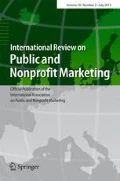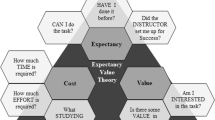Abstract
The purpose of this research is to determine whether the Net Promoter Score (NPS) is relevant in higher educational institutions. The likelihood to recommend (LTR) of a business degree was examined in relation to the conceptualized antecedent factors of students’ university experience using NPS to identify different groups of students. To measure the conceptualized constructs, data is collected from students enrolled in a state university using an online survey. ANOVA is used to test the differences among NPS groups identified and the path analysis is used to test the relationships between antecedent factors and their LTR. All hypothesized relationships between antecedent variables, satisfaction, and LTR are confirmed. Results indicate a substantial divergence between the NPS of the business program and the NPS of university. In-depth qualitative interviews provided intriguing justifications for the variations in scores. Although the methodology used does not support generalization, we identify key challenges faced by the university students when recommending a business program to their friends and relatives. We make recommendations for how college administrators might use NPS data to their advantage while working to enhance the college experience for students. NPS is a simple, useful metric that offers valuable information about students’ experiences. Regardless of the nature of the higher education environment, higher education institutions can readily adopt and use it on a regular basis in addition to the current student satisfaction measurements employed at various touch points.


Similar content being viewed by others
References
Al-Zamil, K. M. (2017). Measuring the advocacy levels for UBT student by using Net Promoter Score. Saudi Journal of Business and Management Studies, 2, 264–269.
Andaleeb, S. S., & Kara, A. (2013). The structure of service quality perceptions for multiple-encounter services. Quality Management in Healthcare, 22(4), 306–321.
Anil, N. K., & İçli, G. E. (2013). MBA students’ satisfaction and loyalty: State vs. private universities in Turkey. TRŽIŠTE, 25(2), 177–198.
Arslan, S., & Akkas, A. (2014). Quality of college life (QCL) of students in Turkey: Students’ life satisfaction and identification. Social Indicators Research, 115(2), 869–884.
Baehre, S., O’Dwyer, M., O’Malley, L., & Lee, N. (2022). The use of Net Promoter Score (NPS) to predict sales growth: insights from an empirical investigation. Journal of the Academy of Marketing Science, 50(1), 67–84.
Bitner, M. J. (1990). Evaluating service encounters: The effects of physical surroundings and employee responses. Journal of Marketing, 54(April), 69–82.
Brooks, R. (2003). Young people’s higher education choices: the role of family and friends. British Journal of Sociology of Education, 24(3), 283–297.
Clark, M., Fine, M. B., & Scheuer, C. L. (2017). Relationship quality in higher education marketing: the role of social media engagement. Journal of Marketing for Higher Education, 27(1), 40–58.
David, M. E., Ball, S. J., Davies, J., & Reay, D. (2003). Gender issues in parental involvement in student choices of higher education. Gender and Education, 15(1), 21–36.
Davis, H., Douglas, S., & Silk, A. (1981). Measure unreliability: A threat to cross cultural marketing research. Journal of Marketing, 45(2), 98–109.
DeShields, O. W., Kara, A., & Kaynak, E. (2005). Determinants of business student satisfaction and retention in higher education: Applying Herzberg’s two-factor theory. International Journal of Educational Management, 19(2), 128–139.
Elliott, K. M., & Healy, M. A. (2001). Key factors influencing student satisfaction related to recruitment and retention. Journal of Marketing for Higher Education, 10(4), 1–11.
Gürüz, K., Şuhubi, E. A. M., Şengör, C., Türker, K., & Yurtsever, E. (1994). “Türkiye’de ve Dünyada Yükseköğretim. Bilim ve Teknoloji. Türk Sanayicileri ve İşadamları Derneği (TÜSİAD).
Joreskog, K. G., & Sorbom, D. (1988). LISREL VII: Analysis of linear structural relationships. Scientific Software.
Kara, A., Mintu-Wimsatt, A., & Spillan, J. E. (2022a). An application of the net promoter score in higher education. Journal of Marketing for Higher Education (forthcoming). https://doi.org/10.1080/08841241.2021.2018088
Kara, A., Spillan, J. E., & Bell, C. (2022b). Efficacy of the net promoter score in predicting online MBA students’ intentions to give back to their alma mater. Working paper.
Lundvall, B. A. (2008). Higher education, innovation and economic development. Higher Education and Development, 8, 201–228.
Maglio, P. P., & Spohrer, J. (2008). Fundamentals of service science. Journal of the Academy of Marketing Science, 36, 18–20.
Marangoz, A. Y., & Arslan, F. M. (2015). Üniversitelerin pazarlanmasinda tutundurma boyutu: kavramsal bir irdeleme. Toros Üniversitesi İİSBF Sosyal Bilimler Dergisi, (Vol. 2, No. 4). Document is available at https://dergipark.org.tr/en/download/article-file/270059. Accessed 1 April 2022.
McKnight, O. T., Paugh, R., Frey, K., & Song, C. (2019). Enhancing return on marketing investment: the net-promoter score in higher education. Marketing Management Association (MBAA International), pp. 1–8. Document is available at https://works.bepress.com/oscar_mcknight/63/. Accessed 22 April 2022.
Morse, R., & Castonguay, A. (2021). 2022 Best Global Universities Rankings. US News and World Report, October. Document is available at https://www.usnews.com/education/best-global-universities/. Accessed 22 Feb 2022.
Oliver, R. L. (1999). Whence consumer loyalty? Journal of Marketing, 63, 33–44.
Reay, D., David, M., & Ball, S. (2001). Making a difference?: Institutional habituses and higher education choice. Sociological Research Online, 5(4), 14–25.
Reichheld, F. F. (2003). The one number you need to grow. Harvard Business Review, 81(12), 46–55.
Seth, S., Scott, D., Svihel, C., & Murphy-Shigematsu, S. (2016). Solving the mystery of consistent negative/low net promoter score (NPS) in cross-cultural marketing research, Asia Marketing Journal, 17(4), 43–61. https://doi.org/10.53728/2765-6500.1411
Seymour, D. T. (1992), On Q: Causing quality in higher education, Macmillan Publishing Company, 100 Front St., Riverside, NJ 08075-7500.
Temizer, L., & Turkyilmaz, A. (2012). Implementation of student satisfaction index model in higher education institutions. Procedia-Social and Behavioral Sciences, 46, 3802–3806.
Weerasinghe, I. M. S., Lalitha, R., & Fernando, S. (2017). Students’ satisfaction in higher education. American Journal of Educational Research, 5(5), 533–539.
Zineldin, M., Akdag, H. C., & Vasicheva, V. (2011). Assessing quality in higher education: New criteria for evaluating students’ satisfaction. Quality in Higher Education, 17(2), 231–243.
Author information
Authors and Affiliations
Corresponding author
Ethics declarations
Conflicts of interests/Competing interests
The authors declare that the article is their own work and they have no known competing financial interests or personal relationships that could have appeared to influence the work reported in this paper.
Additional information
Publisher’s note
Springer Nature remains neutral with regard to jurisdictional claims in published maps and institutional affiliations.
Rights and permissions
Springer Nature or its licensor (e.g. a society or other partner) holds exclusive rights to this article under a publishing agreement with the author(s) or other rightsholder(s); author self-archiving of the accepted manuscript version of this article is solely governed by the terms of such publishing agreement and applicable law.
About this article
Cite this article
Kara, A., Zeren, D. The relationship between the Net Promoter Score (NPS) and students’ college experiences at a state university. Int Rev Public Nonprofit Mark 20, 721–737 (2023). https://doi.org/10.1007/s12208-022-00352-4
Received:
Accepted:
Published:
Issue Date:
DOI: https://doi.org/10.1007/s12208-022-00352-4




